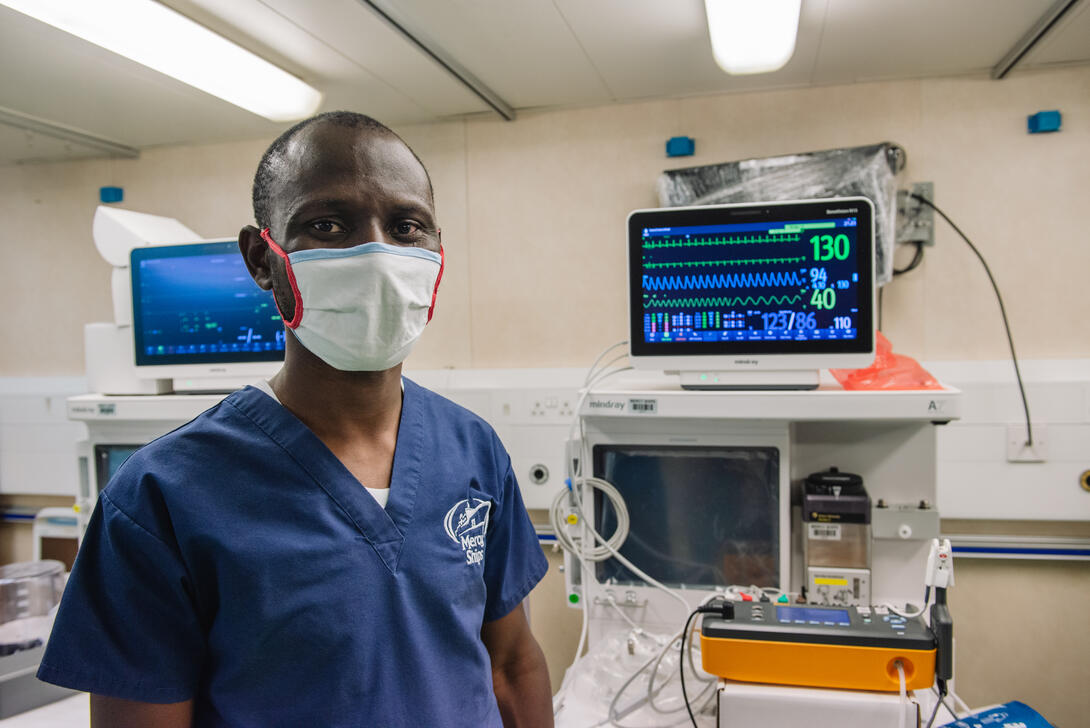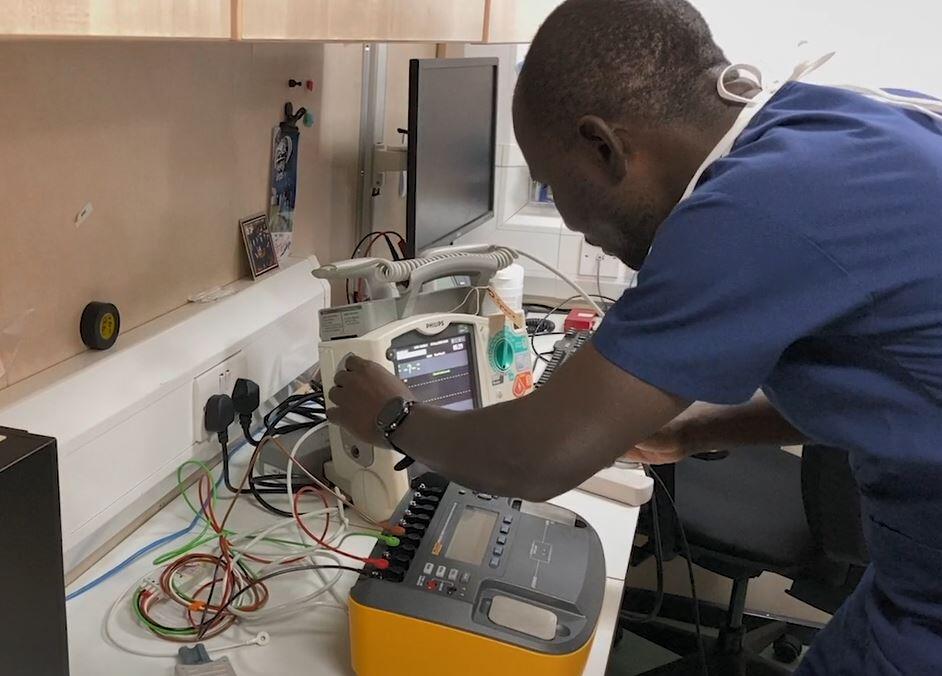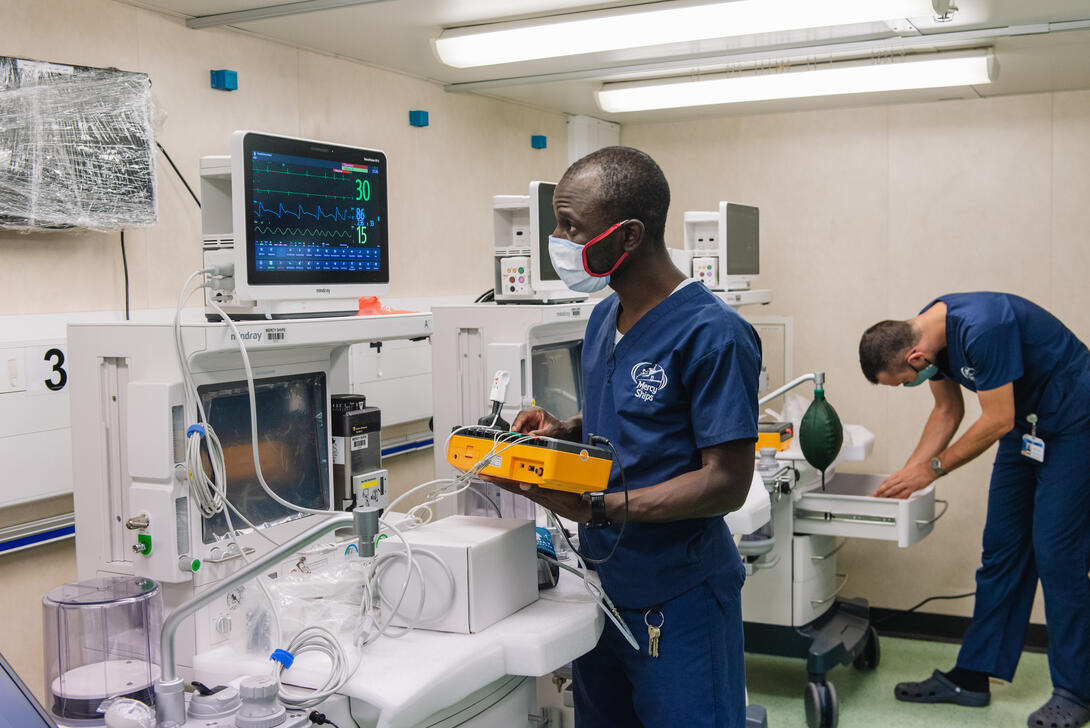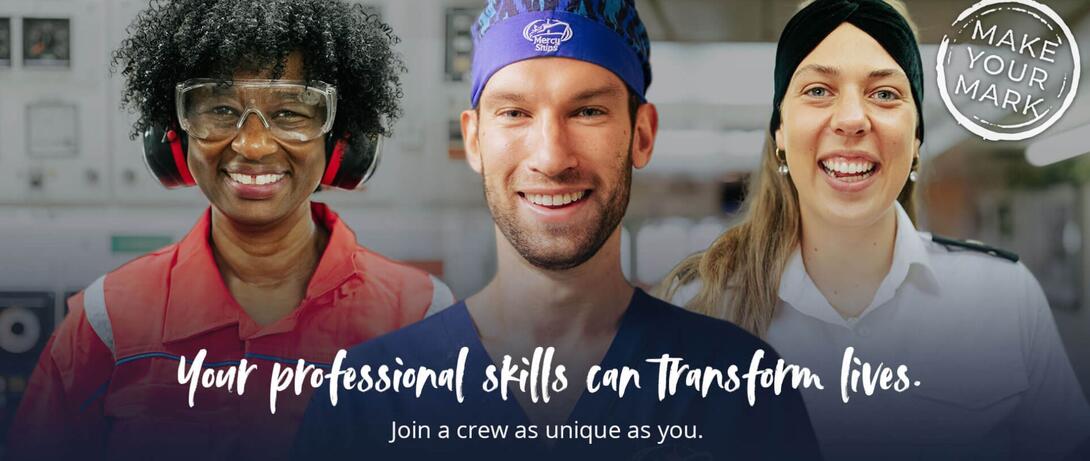Beyond the Hospital Ship in Africa
Founded in 1978, the Mercy Ships organization sends floating hospitals to the far reaches of the globe to provide state-of-the-art, free medical services to people who otherwise lack access to safe, affordable surgical care. More than 50% of the world’s population lives within a 100-mile range of the coast. These modern hospital ships sail with a crew of hundreds and while in port (approximately 10 months), offer medical care so desperately needed by the citizens of the country. With no access to replace tools or medical equipment on location, biomedical technicians on board have to be skilled at maintenance, and creative at problem solving.

Emmanuel Essah, from Benin, West Africa has been working with Mercy Ships for over 10 years. He serves as the biomedical equipment technician (BMET) and country engagement biomedical project manager. With his background as a telecommunications engineer, translator, IT staff, and BMET, Emmanuel ensures on-board medical equipment is well-maintained, properly calibrated, and functioning safely. But Emmanuel does much more than that: he trains other BMETs in Africa to do the same work in their hospitals and medical centers. “I work on one of the important capacity building programs of Mercy Ships. Through this program, local, in-country biomedical engineers improve and retain the skills and knowledge to do their job competently and maintain the surgical safety, operation safety of the equipment available in their healthcare systems.”
Developing Biomedical Experts in Africa
Emmanuel and the team visit a country in Africa about a year ahead of the ship to assess the local technical and engineering capacity. They conduct in-depth interviews with college technology staff and the ministry of health to understand the problems, challenges, and requirements for improved healthcare equipment maintenance. They visit and evaluate the local colleges and determine what is needed for training and test equipment: what tools they use or if they don't use any. The learnings from the interviews help Emmanuel and the team formulate a suitable biomedical equipment training project. When the ship gets into the country, the training is delivered to the participants. “Once the ship gets into the country, we run a biomedical capacity program for eight to nine weeks in partnership with the minister of health. I have been a happy user of Fluke Biomedical test equipment for over six years or so and Fluke Biomedical test equipment is what we use in the training programs. I enjoy using it; and it is solid, intuitive, easy to use. We use it to train participants/biomedical engineers. Most of the countries that Mercy Ships visits do not have a centralized location for learning test equipment, nor do they have a calibration center. And that is why Mercy Ships donates test equipment to these hospitals so that they have an idea about what they should have in their healthcare system for them to improve patient safety.”
“Participants travel for training from regions in the country that we identify, sometimes in collaboration with the minister of health. On average, we train about 18 engineers a year. These participants or biomedical engineers serve as biomedical technicians in their hospitals and in the government centers, and that's where they come from for the training. After they finished their training, they return to their locations and we visit them in the hospitals to run the mentoring program. We spend a couple of days, and just to see how the training participants manage, how we can support them to improve their work, confirm they put into practice the things that they learned in the training, and empower them.”
Many of the participants travel long distances to take part in the training and, no matter how far, the Mercy Ships team goes to wherever they live to encourage them and offer support. One person in Guinea traveled over 1000 kilometers. Emmanuel says, “it doesn’t matter how far away they are; we go anywhere from zero kilometers to 2000. So far in Senegal, we have gone about 700 kilometers, to the Northern parts of Senegal. We do regular follow-ups after the training to see how participants are doing and we stay in contact with them through an app communication or emails. Every country is different and has based on their specific needs. We deliver projects that are best suited to their situation.”
Positive Results

Emmanuel is very encouraged by the response to the training program. “Sometimes we are not sure if the people that we've trained are able to carry on all the things that we've taught them. But for these guys to come back and to say, Hey, I really want to make this an important thing, biomedical engineering services in my country. In Guinea, the participants told me how useful the information was for them. And how important it was to see patient safety from a different perspective. It also allowed them to realize how important their job is as a biomedical technician in the healthcare ecosystem. Another participant who we trained in Senegal, was pursuing a master’s degree in healthcare facility management. For his thesis, he proposed a project to install a medical equipment calibration center in the Northern part of Senegal. He was inspired by the training because he realized the importance of electrical safety testing, and performance verification with the biomedical test equipment, like patient simulators, an ESU analyzer and, defibrillator analyzers.
He wants to put together a project to set up medical equipment, a performance verification center, and a calibration center in Senegal. And for me, it was encouraging that they are carrying the vision on and the things that we taught them are inspiring them. They are realizing the importance of patient safety and want to install that in the healthcare system and make it a priority. It was so heartening for me and for Mercy Ships to know that.”
Every day with Mercy Ships is different for Emmanuel, he can be on-board the ship using Fluke Biomedical tools to evaluate and calibrate the equipment or working on scheduling a meeting with the ministry of health/hospitals/participants or delivering biomedical training or preparing the mentoring program. “Depending on the time of year of the field service, my days are not the same, I’m not doing the same thing, it’s always changing and keeps it exciting.”
The Future
While Emmanuel and his team have trained many technicians and engineers on the importance of testing and calibrating medical equipment, there is a shortage of qualified biomedical engineering instructors who can provide quality training. And, in most developing countries, there is also a lack of access to a well-equipped lab to enhance professional training to local biomedical technicians. In his dreams of the future, Emmanuel would like to see every country have at least one fully equipped lab and workshop with all the necessary tools available to thoroughly train biomedical technicians.
Emmanuel explains the situation:
“We have completed the biomedical training project in Madagascar, in Cameroon, in Guinea and ,in Senegal where we used Fluke test equipment. But we are also looking at how we make this training even safer, like calibration for the test equipment. Because it is one thing is to have the test equipment, but I want to make sure that the values that we are measuring are reliable. But, for the most part, there isn't any biomedical test equipment in the hospitals. Even when we go to a university or a training school it is difficult to find test equipment. When engineers are trained on the right tool, they will be able to run the quality control on medical equipment as they should.

One of Mercy Ships’ goals is to create an environment that allows the training of professional biomedical technicians. I'll give you an example. I have the privilege of leading a project in Guinea where we are setting up a dream center. This training center has many types of test equipment like patient simulators, a defeat analyzer, an infusion pump analyzer, a gas analyzer, an electrical safety analyzer, digital multimeters, and other Fluke Biomedical test equipment. All the test equipment that biomedical engineers need. We are creating this training center with the test equipment on which we can train local biomedical engineers.
It will be a place that can serve as a reference because when your country is in conflict it is difficult to have to dream about something. But when you have a reference, then you either want to duplicate it or do something similar to improve the healthcare system in your country. When we have a center of excellence, where people come to train, they will have an idea about what a biomedical service and workshop should look like. They can go back to their country and try to do something similar that can meet standards and regulation to contribute to this patient safety in their hospitals or countries.”
A new ship, the Global Mercy, is being built and is much larger than the Africa Mercy. It is 174 meters long (570 feet) with 12 decks, two of which are for the hospital. There will be three biomedical technicians on board with a dedicated workshop and a whole range of Fluke Biomedical test equipment. The Mercy Ships organization is actively looking for volunteers to staff the new ship and the biomedical equipment department. Working on the hospital ship is a unique and highly worthwhile experience for the right technician.

Mercy Ships deploys hospital ships to transform lives and serve nations, and a crew of volunteer professionals from around the world makes our mission possible. More than 1,200 volunteers from over 60 nations serve with Mercy Ships each year.
From surgeons and medical staff to the captain, cooks, AV technicians, teachers, electricians, biomedical technicians, etc., our crew makes up a plethora of skills and specialties needed to make a difference in the countries we serve!
Together, we’re bringing hope and healing – join us!
Interested to learn more about Mercy Ships or how you can help to leave a lasting legacy in Africa? Go to our VOLUNTEER PAGE.
